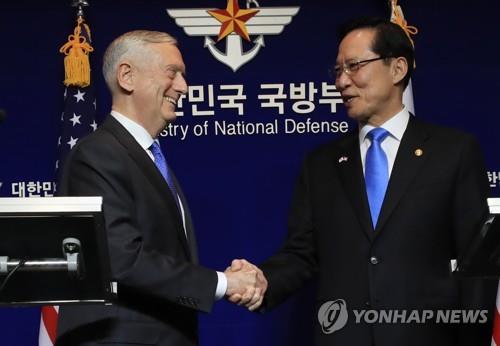The defense chiefs of South Korea and the United States made clear Saturday that North Korea's provocations will never be tolerated, as the two warned any act of aggression will be met with a "massive military response."
They also stressed it's pipe dream for North Korea to be recognized as a nuclear power.
The allies "reaffirmed that any North Korean aggression or military provocation will not be tolerated," read the joint communique issued after their annual defense ministerial talks.
The two sides will continue combined efforts to "make North Korea understand that it cannot achieve the ends it seeks through its provocative behavior," it added.

South Korea's Defense Minister Song Young-moo told reporters that he and U.S. Secretary of Defense James Mattis condemned the North's reckless provocations, including a series of recent ballistic missile launches and a nuclear test. "(We) have agreed to support both countries' diplomatic efforts to attain the denuclearization (of the North) with the robust combined defense posture," he told a joint press conference with Mattis following the 49th Security Consultative Meeting (SCM).
The Pentagon chief warned that North Korea will be defeated with a "massive military response" if it attacks his country or its allies.
"Make no mistake -- any attack on the United States or our allies, will be defeated," he said. "Any use of nuclear weapons will be met with a massive military response."
He said it's unthinkable for the communist North to become a nuclear state, which is the Kim Jong-un regime's key policy goal.
"I cannot imagine a condition under which the United States
can accept North Korea as a nuclear power," Mattis said.
He pointed out the allies' coordination has taken on new urgency as the North has accelerated its threats with "illegal" and "unnecessary" nuclear and missile programs.
The North's military is overmatched by the allies' combined firepower, he stressed.
"If it remains on its current path of ballistic missiles and atomic bombs, it will be counterproductive, in effect, reducing its security," the Pentagon chief said.
The U.S. has many "military options" designed to buttress diplomatic efforts to denuclearize the Korean Peninsula and strengthen deterrence, he added without elaborating.
He voiced a negative view on the redeployment of the U.S. tactical nuclear weapons demanded by some South Korean people.
He cited the possibility of adverse effects to global nonproliferation efforts.
On Seoul's pursuit of regaining its wartime operational control (OPCON) of its forces, Mattis said the two sides are continuing consultations for the "conditions-based" transition with no specific deadline.
It's aimed at giving South Korea adequate time to beef up its own defense capabilities and assume the leading role in the event of war.
According to the joint communique, Song and Mattis were "updated on the draft organization of the future Combined Forced Command" from the Military Committee Meeting (MCM), a consultation channel between the heads of their Joint Chiefs of Staff.
They decided to continue to refine the draft through combined exercises and certifications, and re-examine the implementation plan for OPCON transition for an update at next year's SCM.
The two sides reaffirmed their plans to "enhance rotational deployments of U.S. strategic assets in and around the peninsula."
For South Korea, U.S. strategic assets usually mean such high-profile weapon systems as bomber jets, aircraft carriers and nuclear-powered submarines.
"They reaffirmed the need to continue promoting combined exercises and training events, and to enhance combined capabilities to prepare for any North Korean provocations in the vicinity of the Northwest Island and Northern Limit Line (NLL)," according to the document.

